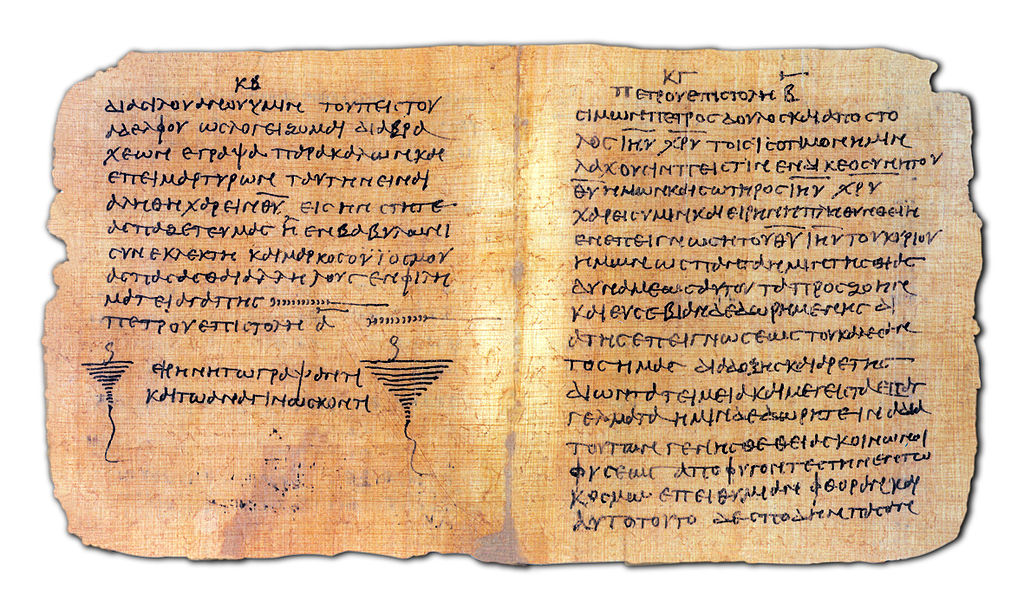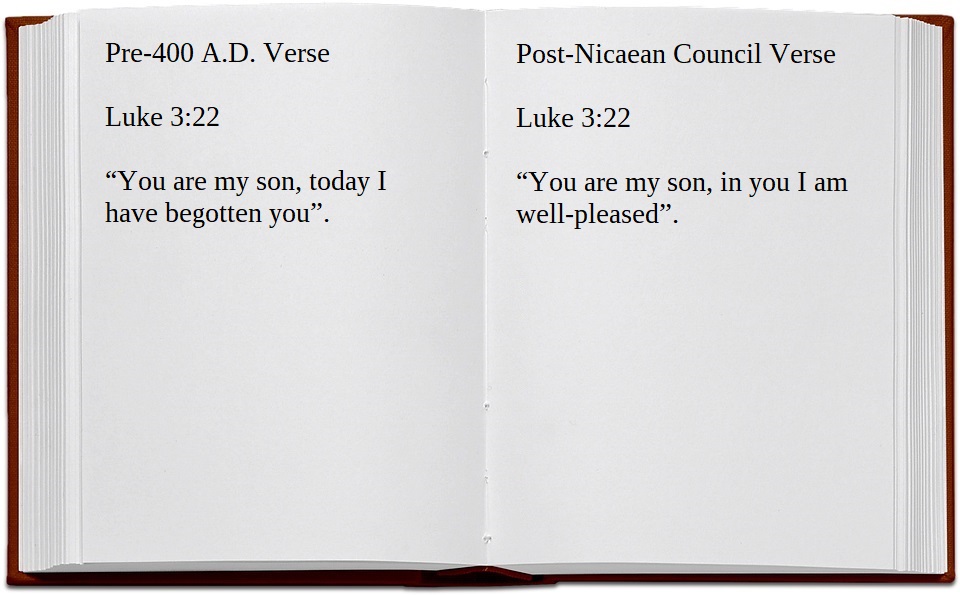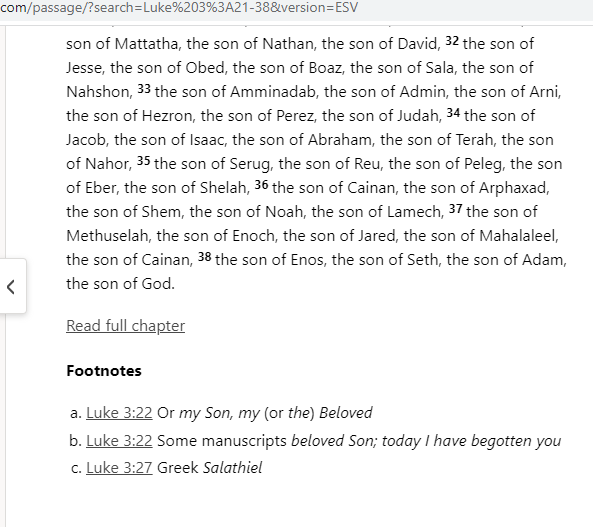
For the first four hundred years of the church, early church writers quoted the Bible with gusto because there were many sects in the early church with wildly differing doctrines and they all spent a ton of time writing (like this) to denounce the other.
Because of these passionate writers, we have evidence that the content of the apostle’s letters was changed many times by the apostate church to agree with doctrine that opposed the truth.
8 “How can you say, ‘We are wise, and the Torah of the LORD is with us’? But behold, the lying pen of the scribes has made it into a lie.
Just as the Torah was corrupted by scribes, so were the manuscripts that make up the Bible. However, for something to be counterfeit, there has to be something to counterfeit. It just takes a little investigation on our part to find the truth so we’ve done the work for you.
To understand why this happened, use this link.
Luke 3:22, You Are My Beloved Son, Today, I have begotten you.
One of the most important examples of deception and corruption comes from the baptismal account of Jesus, which was recorded in Luke. In most of the present-day versions of Luke, Jesus is baptized by John, and as he comes up out of the water, the Spirit descends upon him and a voice comes from heaven and says, “You are my son, in you I am well-pleased”. (Luke 3:22)
The way Luke now reads is not the way it read before the Nicaean Council. Forensic research of ancient quotes of this verse reveals that Luke 3:22 was changed after the council of Nicea in the fourth century because, the only way that Luke 3:22 was quoted by the early church before 400 AD was this way:
‘You Are My Beloved Son, Today, I have begotten you.’
If someone were to look back in time from the future, to today, they would know what our versions of the Bible said by our quotes of the Bible. We spend a lot of time quoting the Bible. Likewise, the early church fathers spent a lot of time quoting the books they had. So, we can look back from any point in the future to any point in the past and know what their versions of the Bible say by their quotes of the Bible.

Evidence that Luke 3:22 Was Changed Comes from Forensic Research. Luke 3:22 was always quoted, ‘You are My son, this day I have begotten you,’ until after the council of Nicea. Then, the quotes stop and the verse is changed.
The following quotes are from the days of the apostles until just after the Council of Nicea. These quotes reveal that the only way Luke 3:22 was quoted in the early days of the church were: ‘Thou art my Son, to-day have I begotten Thee.’”
Clement – Epistle Composed pre-70 AD
In the First Epistle of Clement to the Corinthians, he says: “But concerning His Son the LORD spoke thus: ‘Thou art my Son, to-day have I begotten Thee.’” (Ante-Nicene Fathers, volume 1, p. 15)
This epistle mentions the sacrifices were still ongoing at Jerusalem, this means that this was written before 70 AD because in 70 AD, the Temple at Jerusalem was destroyed by Roman armies ending the sacrifices. (“First Epistle of Clement to the Corinthians,” Wikipedia )
165 AD, Justin Martyr
In a writing by Justin Martyr known as the Dialogue with Trypho, chapter LXXXVIII, Justin references the Gospels’ baptism accounts:
He was in the habit of working as a carpenter when among men, making ploughs and yokes; by which He taught the symbols of righteousness and an active life; but then the Holy Ghost, and for man’s sake, as I formerly stated, lighted on Him in the form of a dove, and there came at the same instant from the heavens a voice, … ‘Thou art My Son: this day have I begotten Thee.’ (Dialogue with Trypho)
In Trypho the Jew Justin quotes this again:
For this devil, when [Jesus] went up from the river Jordan, at the time when the voice spake to Him, “Thou art my Son: this day have I begotten Thee,” is recorded in the memoirs of the apostles to have come to Him and tempted Him, even so far as to say to Him, “Worship me;” and Christ answered him, “Get thee behind me, Satan: thou shalt worship the Lord thy God, and Him only shalt thou serve.” chap. CII.
160 AD – Clement of Alexandria
In Chapter VI of Book One, The Instructor, Clement of Alexandria says: “For at the moment of the Lord’s baptism there sounded a voice from heaven, as a testimony to the Beloved, ‘Thou art My beloved Son, to-day have I begotten Thee.’” (Ante-Nicene Fathers – CLEMENT OF ALEXANDRIA/The Instructor/Book I/Chapter VI,” at wikisource)
Another account is found in Clement of Alexandria, Christ, the Educator, Vol. 23 at page 25: ‘When the Lord was baptized, a voice loudly sounded from heaven, as a witness to him who was beloved, ‘Thou art my beloved son, this Day I have begotten thee.‘
After 200 AD, Origen
In Origen’s Commentary on the Gospel of John, he writes: “None of these testimonies, however, sets forth distinctly the Savior’s exalted birth; but when the words are addressed to Him, ‘Thou art My Son, this day have I begotten Thee,’ this is spoken to Him by God.” (Early Christian Writings)
234 AD, Acts of Peter and Paul
In the Acts of the Holy Apostles Peter and Paul, it says: “Him, therefore, to whom the Father said, Thou art my Son, this day have I begotten Thee, the chief priests through envy crucified.” (Ante-Nicene Fathers/Volume VIII/Apocrypha of the New Testament/Acts of the Holy Apostles Peter and Paul/Acts of the Holy Apostles Peter and Paul,” Wikisource)
300 AD, Methodius
Methodius, The Banquet of the Ten Virgins, Concerning Chastity:
“Now, in perfect agreement and correspondence with what has been said, seems to be this which was spoken by the Father from above to Christ when He came to be baptized in the water of the Jordan, ‘Thou art my son: this day have I begotten thee.’” (Ante-Nicene Fathers/Volume VI/Methodius/Banquet of the Ten Virgins/Thekla/Part 9,” wikisource).
300 AD, Lactantius
Lactantius, in The Divine Institutes, says, “Then a voice from heaven was heard: ‘Thou art my Son, today have I begotten Thee.’ Which voice is found to have been foretold by David. And the Spirit of God descended upon Him, formed after the appearance of a white dove.” (Ante-Nicene Fathers/Volume VII/Lactantius/The Divine Institutes/Book IV/Chap. XV,” wikisource)
400 AD
Faustus, below, states that [Jesus] became the Son of God by baptism at the river Jordan. He tells us that the person of whom he spoke at the outset as the son of David was baptized by John, and became the Son of God on this particular occasion, when about thirty years old, according to Luke, when also the voice was heard saying to Him, “Thou art my Son; this day have I begotten Thee.”
This quote begins with Faustus citing how Matthew and Luke read in 400 AD through ‘The Writings Against the Manicheans and Against the Donatists‘, in Book XXIII at 313.
‘I will, for the present, suppose that this person was right in saying that the son of David was born of Mary. It still remains true, that in this whole passage of the generation no mention is made of the Son of God till we come to the baptism; so that it is an injurious misrepresentation on your part to speak of this writer as making the Son of God the inmate of a womb. The writer, indeed, seems to cry out against such an idea, and in the very title of his book to clear himself of such blasphemy, asserting that the person whose birth he describes is the son of David, not the Son of God. And if you attend to the writer’s meaning [i.e., Matthew’s meaning] and purpose, you will see that what he wishes us to believe of Jesus the Son of God is not so much that He was born of Mary, as that He became the Son of God by baptism at the river Jordan. He tells us that the person of whom he spoke at the outset as the son of David was baptized by John, and became the Son of God on this particular occasion, when about thirty years old, according to Luke, when also the voice was heard saying to Him, “Thou art my Son; this day have I begotten Thee.”
‘This day I have begotten you’ Found in Many Ancient Sources
Throckmorton in Gospel Parallels states that this version of the Baptismal (“this day I have begotten thee”) is found in the following ancient manuscripts: Paris Papyrus, Sinaiticus, A B, Codex Alexandrinus, and Codex Vaticanus, “ and W. It is also found in Codex D. Almost all of them were written prior to the Nicaean Council.
And this verse is found in several other early church manuscripts well:
The Instructor;
The Banquet of the Ten Virgins;
Concerning Chastity;
and the Acts of the Holy Apostles Peter and Paul.
Interestingly, the Bible quotes that God said this to Jesus as well:
For unto which of the angels said he at any time, Thou art my Son, this day have I begotten thee? And again, I will be to him a Father, and he shall be to me a Son? And again, when he bringeth in the first begotten [prōtotokos] into the world, he saith, And let all the angels of God worship him. – Hebrews 1:5-6
The Bible foretold that God would indeed say to Jesus, “Thou art my Son, this day have I begotten thee? but the actual account of it happening in Luke 3:22 is removed.
The apostles testified of God saying these words to Jesus but the account is removed because, as foretold the apostate church, deceived the world.
‘.. all the nations were deceived by your sorcery.‘ (Rev 18)
Bible Footnotes Reveal Ancient Bible Manuscripts Contained this Reading
As the screenshot below of the ESV Bible reveals, Bible scholars are aware of ancient Bible manuscripts containing the original ending, “You are my beloved son. This day I have begotten you.’ (Luke 3:22)

Psalm 2:7 Is Said to be About Jesus
Luke, in the Book of Acts, tells us that Psalm 2 was about Jesus and that it was promised (which means that it had not happened yet), and that it had just happened:
“And we bring you the good news that what God promised to the fathers, this he has fulfilled to us their children by raising Jesus, as also it is written in the second Psalm, ‘You are my Son, today I have begotten you’” (Acts 13:32-33)
Hebrews affirms this:
So also Christ did not exalt himself to be made a high priest, but was appointed by him who said to him, “You are my Son, today I have begotten you” (Hebrews 5:5)
Psalm 2:7 and Hebrews 5;5 both acknowledge that God would say to Jesus on a certain day, “this day I have become your Father:
Luke 3:22 tells the tale of it happening but it’s removed because it doesn’t fit a later developing theology that would eventually deceive all the nations. (Rev 18:23)
Another Point to ponder:
“You are my son. Today, I have begotten you.”
God said these two sentences together because they both meant something important at the moment of the baptism; God was announcing to Jesus, that Jesus was His son.
Jesus wouldn’t have needed God to announce his Sonship (because he would have already known who he was) UNLESS the day of his baptism was the day that he was officially begotten. So, God was telling Jesus that the moment that he was baptized he became the only begotten Son.
The Old Testament attests to this in that Jesus was called God’s servant in the Old Testament, and many verses attest to Jesus being God’s Companion, God’s specific Angel, and the Angel of the Covenant. But then, he became the only begotten Son.
Dr. Bart Ehrman, Best Selling Author, Bible Expert and Scholar, says,
First, even though this reading is found in only one surviving manuscript of the fifth century (our oldest manuscripts of the passages are two Greek copies that come from the middle of the fourth), the passage is quoted by church fathers of the second through fourth centuries. These church fathers lived everywhere from Rome, to Alexandria Egypt, to North Africa, to Palestine, to Gaul and to Spain. And in every single instance the church fathers quotes the verse in this alternative version: “today I have begotten you” (from Psalm 2:7). That’s pretty important: this is the form of the text they were familiar with from the manuscripts available to them (manuscripts that no longer survive, obviously) in their time and place. The earliest form of the text is the one that later made it into only one manuscript.
Why in only one? Because later scribes didn’t like this reading. When deciding which reading is older, one has to ask the following question: if a scribe changed the passage (and obviously one or more scribes did, since we have the passage in two forms) which direction was he more likely to change it? Was he more likely to change “You are my son, today I have begotten you” to say “You are my beloved son in whom I am well pleased” or the other way around?
… So the question is: would a scribe be more likely to change the text in such a way as to make it amenable to a heretical Christology (by quoting Psalm 2:7 at the baptism), or would he be more likely to change it in order to keep it from being used to support a heretical Christology? The answer is: almost certainly the latter.
Later scribes ‘didn’t like’ the reading as it was because it was punishable by death through the Edict against Arians. Emperor Constantine, emperor of Rome, created this edict to force everyone in the Roman Empire to follow the Catholic doctrine which was officially established at the Council of Nicea, 325 AD. The way this verse read contradicted the recently established Roman Catholic theology which stated that Jesus was not a created being, he was co-eternal with the Father, he had always existed, and had always been the Son of God. The way that Luke 3:22 was originally written contradicts this doctrine because the old reading explicitly states that Jesus wasn’t always God’s son because there was a specific day that God said, “You are My son. Today, I have begotten you.”
This is very important because the original reading means that there was a specific day that Jesus became God’s Son, he is not co-eternal, and he wasn’t always God’s son. This meant that the official Church doctrine of the “Godhead” adopted at the Nicaean Council cannot be true and so they changed the verse to agree with the newly adopted official church doctrine.
As Dr. Ehrman stated, “You are My Son, Today I have begotten you,” is the only way that Luke 3:22 was quoted for hundreds of years. Then, after the Nicaean council and Constantine’s subsequent ‘Edict against Arians‘ was made law the verse is changed to read: “You are my beloved son in whom I am well pleased”
As Dr. Ehrman stated “You are My Son, Today I have begotten you,” is the only way that Luke 3:22 was quoted for hundreds of years. Then, after the Nicaean council and Constantine’s subsequent ‘Edict against Arians‘ was made law, the quotes stop and the verse disappears.
MORE CORRUPTED VERSES
Luke 3:22 – Major Critical Corruption of Jesus’ Adoption
1 John 5:7-8 – A corruption so famous that it has a name!
Revelation 1:11 – Criminal Corruption of the Alpha and Omega
The King of Kings – 1 Timothy 6 is translated badly to match Revelation 17
Jump to Chapter
- God’s Last Command to His People: Come out!
- Babylon, the Great Harlot
- The Great Apostasy
- The Beast of Revelation is here!
- God is the I AM! Not the We Are
- Forged Bible Verses